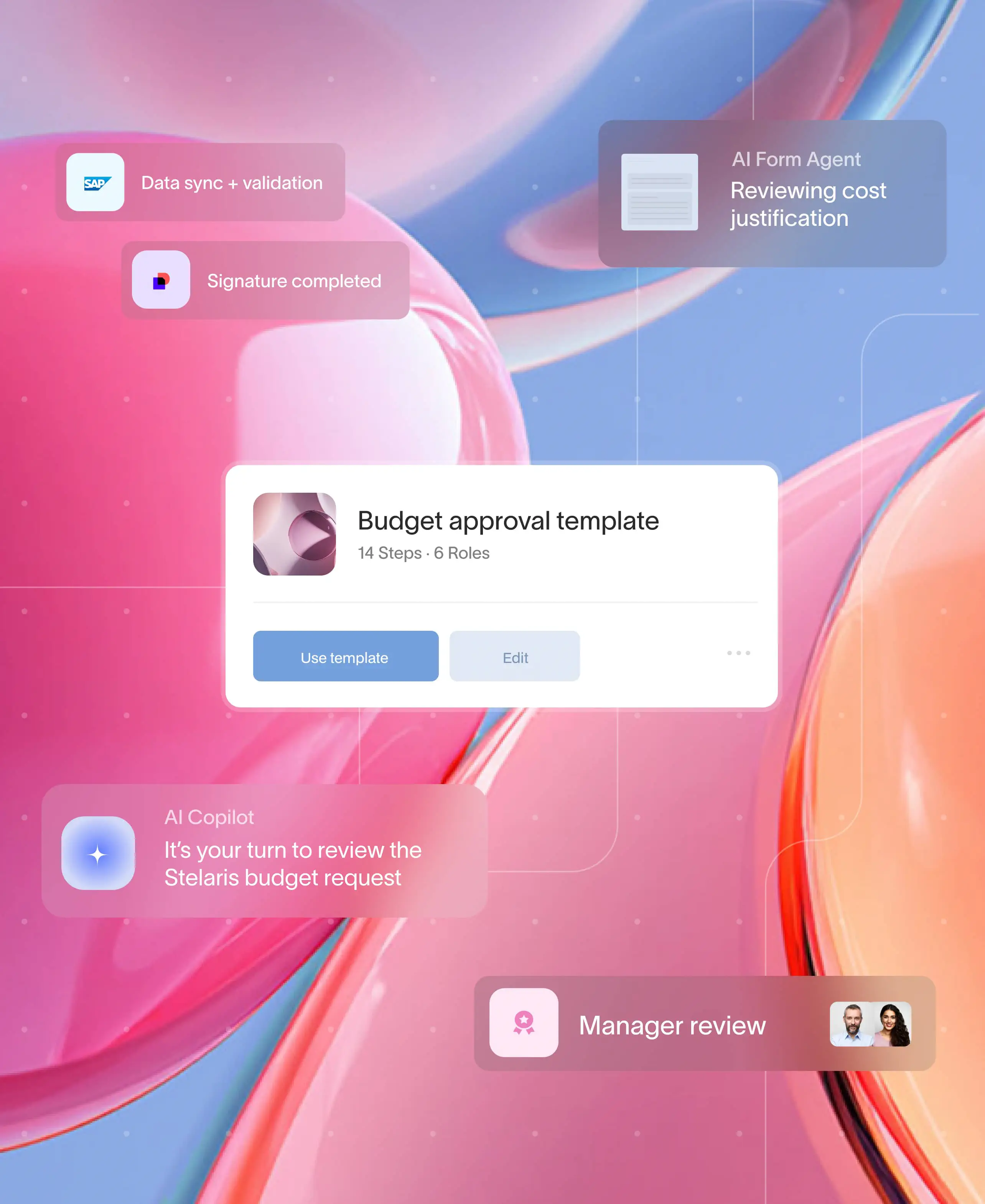.webp)
In an era where the health of our planet hangs in the balance, embracing sustainability has become the north star for businesses striving for a meaningful impact. We’re living in a time when companies are being looked at for more than just their innovative prowess or financial success; consumers today also judge a business by its ability to lead with purpose, safeguard the environment, and ensure they’re part of the solution and not the problem.
At Moxo, we understand that the journey towards business sustainability is a marathon, not a sprint. It’s an ongoing commitment to reducing our environmental footprint, embracing social responsibility, and building economic resilience in ways that were once thought impossible. We're not just participants in this movement; we're champions of a vision where technology, particularly workflow automation, plays a pivotal role in crafting a sustainable future.
Yes, sustainable growth is about harnessing innovation to streamline operations, but it’s also about doing so with a keen eye on the long-term impacts on our planet and its people. In this blog, we’ll delve into the transformative power of business automation workflows, a cornerstone of our mission to promote sustainability in every action and decision.
The efficiency imperative
In today's rapidly evolving business landscape, the quest for efficiency is more than a goal—it's an imperative. Traditional manual processes, from signing documents by hand to managing workflows with stacks of paper, are not just time-consuming; they're relics of a bygone era that slow down operations and inflate resource consumption. These methods, while familiar, are fraught with inefficiencies that can stifle growth and sustainability efforts.
They demand excessive use of physical resources, lead to higher error rates, and detract from a company's ability to operate in an agile and environmentally conscious manner. The shift towards workflow automation isn't just an upgrade; it's a revolution in how we think about and execute business processes, propelling us toward a future where efficiency and sustainability go hand in hand.
- Reduced physical resource use: Automating document workflows cuts down on the need for paper, ink, and physical storage, which in turn reduces your environmental footprint.
- Enhanced accuracy and consistency: Manual processes are prone to human error. Automation ensures that each step is performed consistently, reducing mistakes and the need for time-consuming corrections.
- Streamlined approvals: The digital management of signatures and approvals accelerates decision-making and eliminates the delays associated with traditional paper-based processes.
- Improved visibility and tracking: Automated workflows offer real-time insights into process status, making it easier to identify bottlenecks and optimize operations.
- Unlocked energy and cost savings: By digitizing and automating routine tasks, businesses can operate more leanly, saving on energy costs and reducing the overall cost of operations.
As we embrace the efficiency imperative, it becomes clear that workflow automation is not merely a tool for enhancing productivity; it's a critical component of a sustainable business strategy. By transitioning from outdated manual processes to streamlined, automated systems, companies can achieve remarkable gains in efficiency, reduce their environmental impact, and set the stage for scalable, sustainable growth.
How business automation workflows promote sustainability
In 2024, every business action can have a significant environmental impact, which is why integrating sustainability into core operations has never been more critical. By digitizing and automating business processes, companies can significantly reduce their reliance on natural resources, minimize waste, and enhance their overall efficiency. This shift towards automation and sustainability isn't just about doing more with less; it's about redefining the very essence of business efficiency in a way that respects and preserves our planet for future generations.
Let’s take a closer look at some of the key ways business automation workflows can help foster a more sustainable future for your business.
Digital transformation and reduced resource use
Digital transformation through automation directly contributes to sustainability by drastically reducing the need for physical resources. Moxo's approach to automating document workflows and signatures exemplifies this shift, turning paper-intensive processes into streamlined digital operations. This transformation extends beyond the mere conservation of paper and ink; it encompasses a broader environmental impact through reduced logistics and storage requirements, leading to a significant decrease in a company's carbon footprint.
Enhancing efficiency across the board
Efficiency is at the heart of sustainability. By automating business processes, your business can accomplish more in less time and with fewer resources. This leap in productivity isn't just about economic gains; it's intrinsically linked to sustainability. For example, automation in employee onboarding and logistics management means less energy consumption and lower emissions, as digital processes eliminate the need for physical transport and handling of physical documents. The ripple effect of these efficiencies is profound and offers a blueprint for how businesses can operate sustainably in a competitive market.
Empowering sustainable decision-making
Visibility and control are crucial for sustainable business practices. Automation workflows provide unparalleled insights into business operations, allowing companies to make informed decisions that align with their sustainability goals. By centralizing information and streamlining communication, you ensure that sustainability isn't just a policy, but a practical, measurable aspect of everyday business operations. Having this level of clarity and oversight enables you to identify and implement sustainable practices effectively, from reducing energy use to optimizing supply chains for minimal environmental impact.
Compliance and security: The unsung heroes of sustainability
In the pursuit of sustainability, compliance, and security play pivotal roles. Business automation workflows not only ensure that businesses adhere to environmental regulations and standards, but also secure sensitive information through digital means. This aspect of automation is crucial for building trust and maintaining a company's reputation as a responsible and sustainable entity. Moxo's emphasis on secure, compliant automated processes highlights the synergy between operational excellence and environmental stewardship.
The journey towards sustainability is complex. It requires a nuanced understanding of how technology can be leveraged to foster environmentally friendly practices. Moxo's commitment to integrating business automation workflows into the fabric of sustainability efforts exemplifies a forward-thinking approach that marries efficiency with ecological consciousness. We’re not just imagining a sustainable future; we’re actively building it.
Moxo’s impact in action
Moxo's transformative partnership with Ibero Business Services stands as a shining example of how integrating business automation workflows can significantly advance a company's sustainability goals. Ibero, facing the all-too-common challenge of inefficient, paper-heavy processes, turned to Moxo for a solution that could streamline their operations while also reducing their environmental footprint.
Moxo delivered by digitizing Ibero's workflows, effectively minimizing paper usage, cutting down on waste, and enhancing overall operational efficiency. This shift not only propelled Ibero towards a more sustainable business model, but also demonstrated the broader potential for automation to contribute to environmental stewardship.
By automating business processes, from client onboarding to document management, Moxo helped Ibero reduce its reliance on physical resources and streamline its operations. This led to significant time and cost savings and aligned Ibero's business practices with the principles of sustainability. The partnership is a testament to Moxo's commitment to leveraging technology for a greener future, showcasing the tangible benefits of automation in reducing a company's carbon footprint and promoting a more sustainable approach to business operations.
Chart a sustainable future with Moxo
Business automation workflows catalyze sustainability and require a thoughtful integration of technology and eco-conscious practices. Having a partner who can guide you towards operational excellence doesn't just boost your bottom line, but also contributes to a healthier planet.
Through streamlined processes, reduced resource consumption, and a commitment to efficiency, Moxo's solutions embody the very essence of sustainable innovation. In this era of environmental awareness, the choice to embrace business automation workflows is a statement of purpose.
If your company is ready to embark on this journey towards sustainability, Moxo is here to light the way. Together, we can redefine what it means to be a successful, sustainable business in the 21st century. Reach out to us, and let's create a greener future, one workflow at a time.






